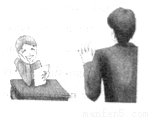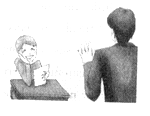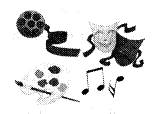
题目列表(包括答案和解析)
Going to a new school can be difficult, but this passage will help you in the beginning. Here is something to help you to fit in(融入).
First, take a day to enjoy your school. You won’t fit in at school if you don’t know the school. Ask for a school map. Try to get to know every corner of your new school. A good school handhook can be of great help. But to make it easy, ask the people near you where something is—tell people that you are new when you need help.

Be nice to everyone. Be nice to everyone, the young or the old, because they might just be your next teacher or friend.
Get to know your teachers and pay attention in class. Teachers always pay attention to(关注) new students, Talk to them and find out more about them. Never test their limits(底线)—don’t go too far, or you may end up getting into trouhle(麻烦)
You need to make friends. Talk to different people. Be yourself and don’t lie. This is YOUR school now, take a chance(机会) on being who you weren’t at your old school. Join a few clubs or sports teams and make more friends in this way.

Be yourself and be polite. Don’t worry too much about what people think of you. Be true, be yourself, and be nice to everyone, no matter how mean(unfriendly) they may seem at first. It’s often the “girl/boy that I did’t like at my new school” that ends up being my friend after a little while. But then again, don’t be afraid to stand up for yourself if it’s very clear that you should.
Work hard to fit in while still being yourself. The first few weeks are always hard, but you’ll soon get used to it.
1.It is very easy to find places in your new school hy ____________.
A. looking at a map B. asking penple for help
C. reading a handbook D. walking around the school
2.The underlined phrase “stand up for yourself” means you should ________.
A. try to stand up all the time
B. be friendly to the mean persons
C. always do things by yourself
D. not change your idea if it’s right
3.The passage is mainly about ________________.
A. how to fit in when at a new school
B. how to make friends at a new school
C. how to enjoy the beauty of the school
D. how to be yourself at a new school


| A.looking at a map | B.asking penple for help |
| C.reading a handbook | D. walking around the school |
| A.try to stand up all the time |
| B.be friendly to the mean persons |
| C.always do things by yourself |
| D.not change your idea if it’s right |
| A.how to fit in when at a new school |
| B.how to make friends at a new school |
| C.how to enjoy the beauty of the school |
| D.how to be yourself at a new school |
When we talk to someone face to face, we try to be polite to them. We believe nicely and are careful not to hurt their feelings. Sometimes when we are on the Internet, we forget that we are also dealing with real people. Did you know there is also a polite way to behave on the Internet? It’s called Netiquette. Here are some examples:
When you type, do not use all big letters. For example, “HELLO, HOW ARE YOU?” looks like you’re shouting. It’s better to write the sentence, “Hello, how are you?”
In a chat room, it’s polite to say hello to other people when you enter. Before you leave the room, you should say goodbye. If you don’t, people may think you’re rude.
If you make a joke, remember to tell people. You can also typeJ or :p. we can use symbols to express many different emotions. On the Internet, we don’t usually see people’s faces. So, we type things to show our feelings. It’s sometimes important to do so, or other people may misunderstand us.
If you belong to an Internet community, try to follow these simple rules of Netiquette. They help make the Internet a nicer place.
36. What’s the main idea of the passage?
A. The Internet is full of rude people. B. The Internet and the real world are very different.
C. It’s important to behave well on the Internet. D. Typing using all big letters is rude.
37. The article suggests we should treat people on the Net _______?
A. worse than we do in person B. like strangers C. like friends D. as politely as in person
38. When you enter a chatroom, you should ______.
A. say hi to everyone B. keep silent C. type in big letters D. tell people what you look like
39. Why should we use symbols like J and :p?
A. To show people how we feel. B. To hide our feelings.
C. To make people misunderstand us. D. To say hello and goodbye to people.
40. Which is an example of good Netiquette?
A. I like my idea better than yours. B. You guys are all stupid!
C. I HAD A TERRIBLE DAY. D. I have to go. I’ll talk to you later.;)

| A.Because he was very clever. |
| B.Because he worked hard. |
| C.Because he spent much time on his work. |
| D.Because he invented many electric appliances. |
| A.a lamp | B.a lamp filament | C.a telephone | D.a light |
| A.he asked his friend to help him |
| B.he asked his friend to go back first |
| C.he didn’t stop to talk with his friend |
| D.he asked his friend to watch him working |
| A.he couldn’t persuade Edison to give up |
| B.Edison didn’t say hello to him |
| C.Edison failed 1,200 times |
| D.he didn’t think Edison was polite to him |
| A.Edison was a hard-working person | B.Edison never gave up |
| C.Edison was rude to friends. | D.Both A and B |
| 完形填空。 | ||||
| A long time ago in India, there was a young king and a wise man who was the king's friend. This king was a good man, 1 he talked too much. In fact, sometimes the king could not stop talking. The wise man thought, "I must 2 the king talk less. But how?" There was a lake not 3 from the palace. A tortoise and two birds lived near the lake, and they were 4 good friends. One day, the birds said to the tortoise, " 5 are going to a beautiful mountain tomorrow. 6 you like to come with us?" The tortoise answered, " 7 can I go with you? I can't fly." "We can take you," the birds said. "Hold a stick in your mouth, and we'll carry the stick between us." "Thank you. You're very 8 , "said the exited tortoise. "Bite on (咬住) the stick,and don't 9 . If you open your mouth, you'll fall," the birds said. The next day, the king and the wise man saw the two 10 in the sky. "Look!" said the king. "Those birds are carrying 11 ! What is it?" The tortoise heard this and wanted to say. "I'm a tortoise! I'm flying!" He opened his mouth to say it, and 12 the ground. "It's a dead tortoise!" said the 13 . "Why did it fall from the sky?" The wise man answered, "This talkative tortoise couldn't hold onto the stick 14 it couldn't keep its mouth shut. Great King, this shows us how bad it is to talk 15 ." The king said, "I understand you, my friend." And after that he became a wiser and less talkative king. | ||||
|
湖北省互联网违法和不良信息举报平台 | 网上有害信息举报专区 | 电信诈骗举报专区 | 涉历史虚无主义有害信息举报专区 | 涉企侵权举报专区
违法和不良信息举报电话:027-86699610 举报邮箱:58377363@163.com